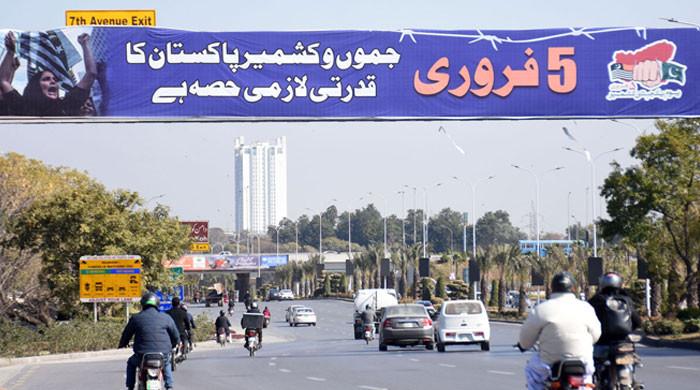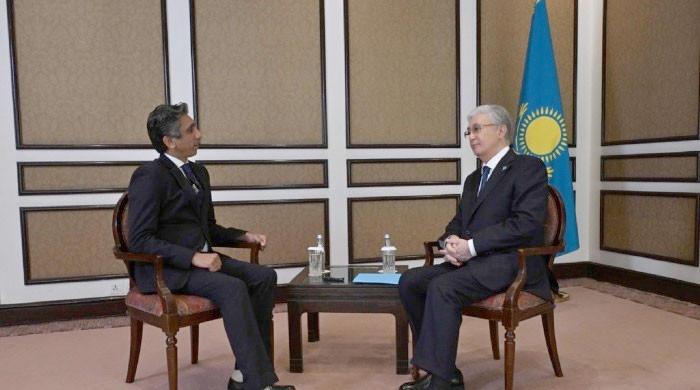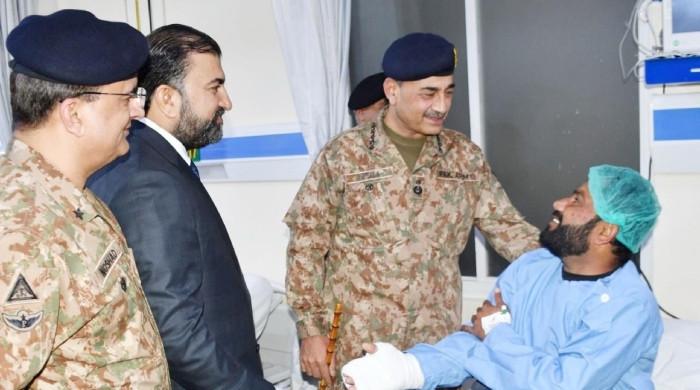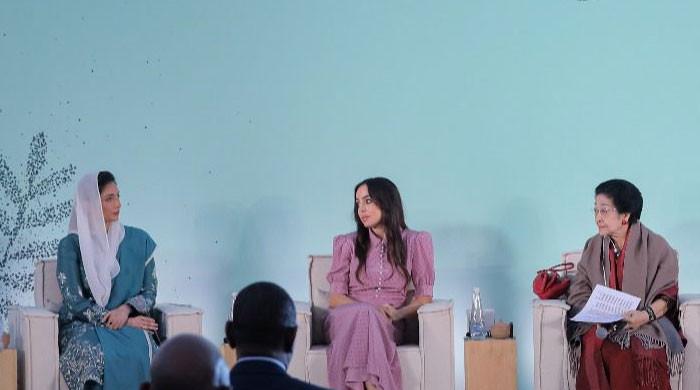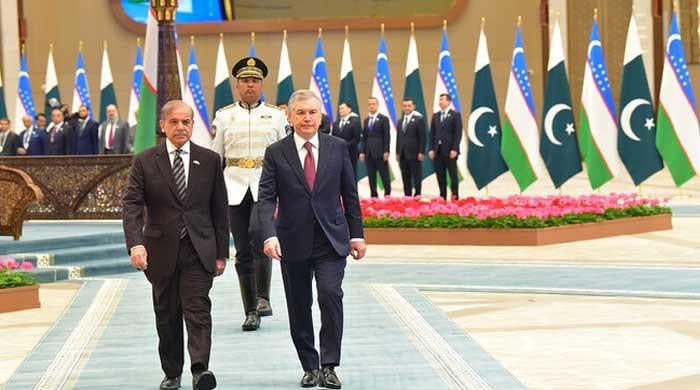COVID-19: PM Imran calls for 'picking up' of poor countries in WEF address
PM Imran Khan says there should 'be a way of picking up countries which are struggling, especially in the developing world'
May 20, 2020
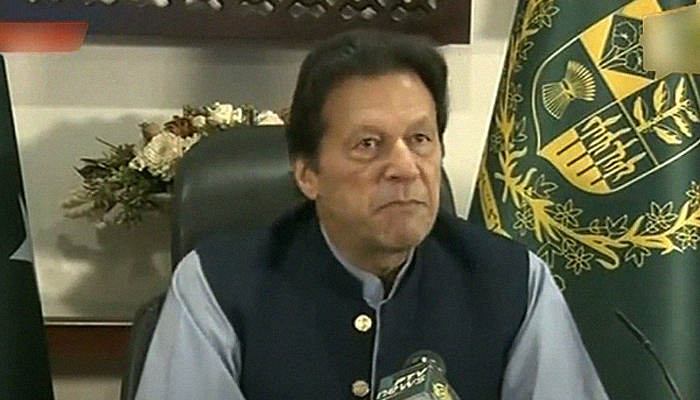
ISLAMABAD: Prime Minister Imran Khan, in an online session of the World Economic Forum (WEF) on Wednesday, called upon the developed countries to provide debt relief to poorer nations that were struggling to cope with the coronavirus pandemic — a crisis that has left their economies battered.
"The experience of the developed world is completely different to what we are facing in the developing world. Countries like India, Pakistan, and Bangladesh — specifically the Indian subcontinent — our experience is somewhat different.
"The speed at which COVID-19 [the disease caused by the novel coronavirus] spread in Europe and the United States, we're not experiencing the same sort of speed.
"On the other hand, we are still facing rising number of cases and we still haven't reached our peak here" in Pakistan, he added.
"From day one, the difference between, say, what we've seen in Europe and the United States — and, in fact, even in China — is that we had to face this twin challenge: one was to stop [and] stem the growth of the virus, hence, the lockdown.
'No way govt can provide for all'
"But the bigger challenge and increasingly in our country is how to mitigate the effects of lockdown on our population with the rising poverty.
"We, in Pakistan, we have 25 million workers who are either daily wagers or get paid weekly or are self-employed. When we [impose a] lockdown like the whole of the world to stop the spread of the virus all these people became unemployed.
"When we are talking about 25 million workers, we are talking about 25 million families. And actually it has affected around almost 120-150 million people [who] face stark poverty.
"Unless the men and the women work, they cannot feed their families. What my government did was we launched a cash programme and reached nearly 15 million families with cash transfers but this is only a short-term solution."
"Therefore, despite the raising cases in our country, we have decided to ease our lockdown and reopen our construction industry so that people can find employment because there is no way that the government can provide for all. The only way we can do that is by providing employment.
'We are connected'
"The way forward that we have this year as a nation is that we realise that we have to live with this virus at least until a vaccine comes out and balances it. We have raised a volunteer force in this regard — of one million volunteers — who will help the administration as it is already overburdened and so are the law enforcement agencies.
"This volunteer force will encourage people not to have large gatherings and spread awareness among masses to follow the SOPs [standard operating procedures] necessary to stem the virus.
"Just before this pandemic hit us, we had managed to balance our twin budgets — the current account and fiscal deficit. After very tough reforms, we had thought of the growth of the economy.
"The coming year is not just a challenge for Pakistan but for the world. There has to be more interaction between the countries in dealing with this challenge so far.
"When it hit the countries, they took unprecedented measures so every country looked inside and became insular. I feel that we are connected and the response has to be global.
Debt relief plan 'needs more details'
"There has to be a way of picking up countries specially in the developing world. I have spoken to the Ethiopian prime minister, the Egyptian president, [and] the Nigerian prime minister [and] all of them are facing similar problems as us.
"Their exports are falling but also, additionally, we face the problem of falling remittances. Our country depends a lot on the remittance from the Gulf countries and due to the fall in oil prices that has had an effect on it.
"We have geared up and our economic think-tanks are mulling over how we are going to deal with the coming year.
"At the same time, we have developed a very good National Command and Control Centre [NCOC] and the whole idea is that we aim to balance the whole thing. They monitor where the cases are growing, how we are going to deal with them, isolate individual areas where there is fear of spreading, and, at the same time, how we can keep our economy going."
Speaking of a global debt programme, PM Imran said: "The G20 has come up with a debt relief plan but it needs more details and work. Let me just put it this way: many of the developing countries face this situation where, because of their debt-servicing, their fiscal space has contracted and they are unable to cope with this challenge of health facilities.
"The reason why there should be a debt relief and the G20 is looking into it is because we need to divert those resources to health and also to environment and, unfortunately, that space is not there," he added.
'Devastated lives and livelihoods'
A day ago, Foreign Minister Shah Mahmood Qureshi said that the premier will discuss pertinent issues during his address to the world leaders.
FM Qureshi said the premier will apprise the international community of Pakistan's viewpoint on coronavirus pandemic, situation in India-occupied Kashmir, and his debt relief proposal for debilitated economies of the world.
According to a WEF report, risk managers expect a prolonged global recession as a result of the coronavirus pandemic.
Half of the risk managers expect bankruptcies and industry consolidation, the failure of industries to recover, and high levels of unemployment, particularly among the young.
“The crisis has devastated lives and livelihoods. It has triggered an economic crisis with far-reaching implications and revealed the inadequacies of the past,” said Saadia Zahidi, managing director of the World Economic Forum.
Pakistan 18th most-affected country
Pakistan is also the 18th most-affected country from the deadly coronavirus across the world as the number of COVID-19 cases surged past 45,000.
Details: With over 45,000 COVID-19 cases, Pakistan 18th most affected country in the world
According to data from the US-based Johns Hopkins University, which has maintained a dashboard of COVID-19 cases worldwide, Pakistan is listed at 19 in terms of the number of people infected, out of a total of 188 countries.
As of reporting time, Pakistan has recorded 47,282 coronavirus cases and more than 1,000 deaths.





